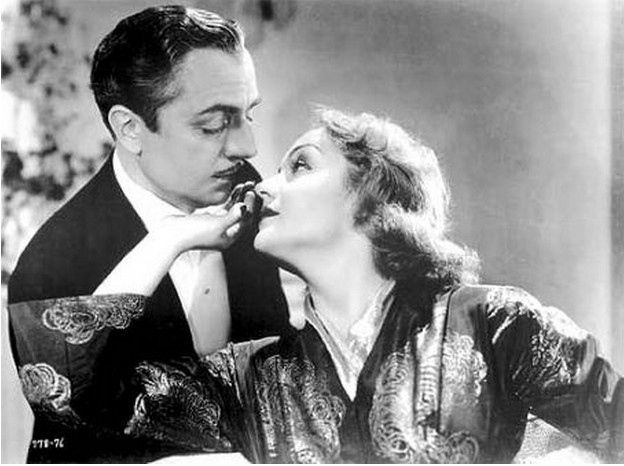 |
| "My Man Godfrey" (1936). |
You can't write a real review of "My Man Godfrey" (1936), directed by Gregory La Cava, without using the phrase "screwball comedy," so there, I've got that out of the way. This film practically defines the phrase. But there is much more to it than that. Made at the height of the Great Depression, "Godfrey" hammers the point home that we shouldn't judge somebody by their current circumstances, which in any event are transient and in no way reflective of the real person underneath.
 |
| The titles have a distinctive art-deco style that immediately sets the mood. |
William Powell, in his classic role, plays a homeless but obviously well-educated man living in a city dump over by ritzy Sutton Place in Manhattan. Suddenly, two sisters of the wealthy Bullock family appear and offer him $5 to accompany them to a scavenger hunt log-in where they can win because they were able to find and bring back a "forgotten man." Now, if the social commentary underlining that isn't obvious, I can't help you. The obviousness is actually part of the comedy, going over-the-top like that makes the serious social point amusing. But in any event, Godfrey performs so admirably as the forgotten man that he manages to insinuate himself into their family's life as their butler. Comic complications ensue.
 |
| The Bullock household is somewhat eccentric. |
Powell is excellent. His intelligence reaches across the screen and grabs you. The direction at times makes the film feel a bit like a stage play, but is still top-notch. Carole Lombard is absolutely brilliant creating a ditsy blonde character that merges wonderfully with her standard brassy persona. Highlights include Lombard bouncing up and down on her bed like a little girl, screaming "Godfrey loves me, Godfrey loves me!," and of course the romantic finale. She rightfully received an Oscar nomination. All of the leads' characterizations ring true, with that zany feel that characterizes, yes, screwball comedies. The fact that Powell and Lombard were married at one point (before Lombard famously married Clark Gable) helps make the central relationship of the film ring true (though they were long divorced at this point).
 |
| William Powell and Carole Lombard play off each other well. |
The film is notable for its snappy patter and clever social commentary, but above all, it is wonderfully funny. Along the way, who is up and who is down gets reversed until a final equilibrium is established at the very end. Those were turbulent and dangerous years, and the film is very reflective of that. In fact, "My Man Godfrey" is probably more relevant now, in the 2000s, than it has been for many, many years. It's still a dangerous world out there, and it pays to be able to live by your wits even if you have other resources. Have them at the moment, that is.
One of the reasons I love this film - one of my favorites - is that it directly addresses the Great Depression that was in full swing at the time. Standard Hollywood films of the period invariably showed the lifestyles of the rich and carefree, or somewhat condescendingly romanticized being poor (see "Hallelujah, I'm a Bum"). This one does, too, but not before giving a good, long look at the very real plight of millions, the ones out in the audience.
The best line in the film, and I'm not giving anything away here, is one spoken by Powell: "It's amazing how fast you can slide downhill when you start feeling sorry for yourself." Isn't that true. And this film shows how wonderful it can be to turn things around and dig yourself out of that hole, helping others in the process.
 |
| Godfrey's transformation during "My Man Godfrey" requires an acting tour de force by William Powell. |
The real reason to see "My Man Godfrey" now is for a glimpse at a world world that no longer exists. It is a privileged world, full of conventions that can be broken and taboos that are no long taboo. If that rarefied world of a few haves among a horde of have-nots interests you, this is a must-see. Certainly, the have-nots of the 1930s enjoyed it, so why shouldn't we?
A great film. A great screwball comedy. There, I've used the phrase three times now. This film deserves all the accolades that it receives. See it.
2017



No comments:
Post a Comment